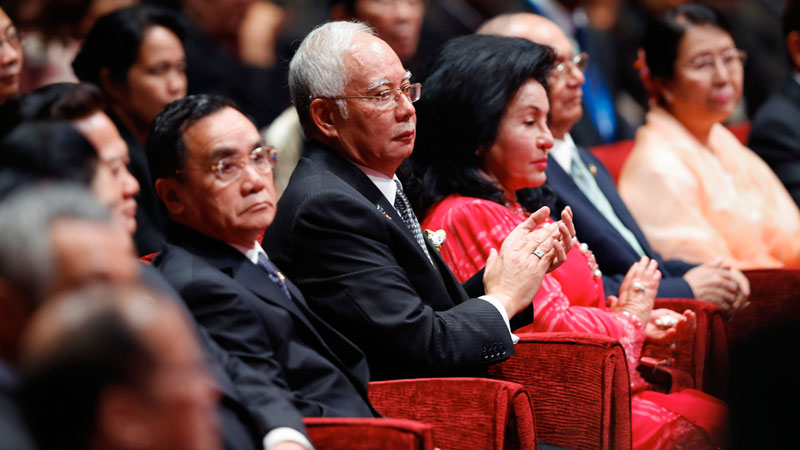
Malaysia’s Prime Minister Najib Razak, fourth right, and Laos’s Prime Minister Thongsing Thammavong, fifth right, attend the opening ceremony for the 26th ASEAN Summit in Kuala Lumpur, Malaysia, on Monday, April 27, 2015. (AP Photo/Vincent Thian)
KUALA LUMPUR—Malaysian Prime Minister Najib Razak on Monday said there should be no turning back from the peace process between the Philippine government and the Moro Islamic Liberation Front (MILF), citing the importance for Southeast Asia to resolve internal conflicts in pursuit of building one regional community.
Najib said this in his welcome address to the region’s leaders at the formal opening of the 26th Association of Southeast Asian Nations (Asean) summit.
“An Asean characterized by internal conflicts could never aspire to be a true community. To be a community, we must address internal conflicts within our region. This is why we are working with other countries to build peace,” Najib said.
He cited the peace deal being forged in Central Mindanao, wherein Malaysia has acted as a third party facilitator.
“The recent progress on the Bangsamoro peace process has been so important, and we must not pause in our efforts to bring a permanent resolution to a conflict that has led to so much loss of life and displaced hundreds of thousands over the years,” Najib said.
In October 2012, Najib witnessed the signing of the Framework Agreement on the Bangsamoro (FAB), the blueprint for the peace agreement between the government and the MILF.
In March 2014, Najib was also at Malacañang in Manila for the signing of the final peace agreement between the Philippine government and the MILF.
But only less than a year after the peace agreement was signed, it faced a major setback when the Mamasapano debacle happened.
The police counterinsurgency operation that took down Malaysian terrorist Zulkifli bin Hir, alias “Marwan,” also cost the lives of 44 Special Action Force (SAF) commandos, 17 MILF rebels and at least three civilians, including an 8-year-old girl. The failure of then SAF commander, Director Getulio Napeñas, to follow the ceasefire mechanisms led to the fierce encounter between his men, the MILF and other Moro fighters.
Filipino lawmakers, many of whom initially supported the peace agreement, disparaged the peace process and threatened not to pass the proposed Bangsamoro Basic Law (BBL), which would give the Moro people a new autonomous region.
At the plenary session of the Asean summit, President Aquino acknowledged the support of Malaysia, Brunei and Indonesia that led to the final peace agreement.
The President also “advocated the use of a grassroots-based, multistakeholder approach to peace-building and reconciliation initiatives.”
Many equate Malaysia’s interest in the peace process to its claim to Sabah but others view it as part of its own national security.
For decades, the war in Central Mindanao has provided a haven for Malaysian Islamic extremists like Marwan who had influenced many others.
Putting an end to the insurgency waged by the MILF, the biggest armed group in Mindanao, makes the world smaller for terrorists.
Najib is at the forefront of an initiative against terrorism in Southeast Asia, particularly those advocating an Islamic State.
The Asean leaders are set to adopt the Langkawi Declaration on the Global Movement of Moderates, a brainchild of Najib.
He said it was important to adopt the declaration as Southeast Asia had not been spared of the “threat posed by extremism.”
He acknowledged that Malaysian nationals had “sadly … joined forces with those in Syria and Iran to commit atrocities in the name of Islam,” and condemned “their actions.”
More than rejecting provocation and violence, Najib urged the Asean to “put forward a positive narrative of moderation, of hope and of peace.”
For his part, Aquino called for “heightened vigilance to curb the rise of religious fanaticism and extremism in the Middle East.”
He reiterated the Philippines’ support for the United Nations Security Council resolution on foreign terrorism, which he said should be implemented to “prevent the spread of terror-related crimes perpetrated by Isis and other similar groups.”